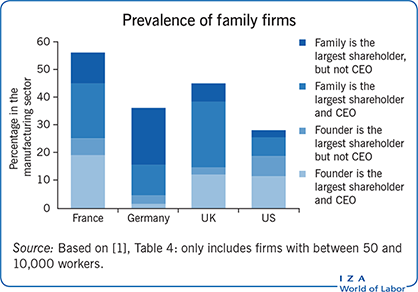Elevator pitch
Family firms are ubiquitous in most countries. The differences in objectives, governance, and management styles between those firms and their non-family counterparts have several implications for the workforce, which scholars have only recently started to investigate. Family firms offer greater job security, employ different management practices, have a comparative advantage to avoid conflicts when employment relations are more hostile, and provide insurance to workers through implicit contracts when labor market regulation is limited. But all this also comes at a cost.
Key findings
Pros
Family firms offer higher job security because they do not adjust employment levels to economic shocks as much as non-family firms.
Labor conflicts are less intense and less frequent in family firms.
Family firms can act as a substitute to publicly provided unemployment insurance or employment guarantees by insuring workers against economic shocks.
Absenteeism is lower in family firms, possibly reflecting higher effort levels.
Cons
Family firms pay lower wages.
Management practices are less conducive to performance in firms that are managed by family members, especially when the manager is the founder’s eldest son.
Family CEOs work less than other CEOs, which may suggest that nepotism, rather than meritocracy, determines promotions in family firms.
